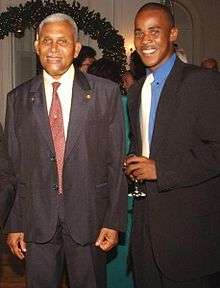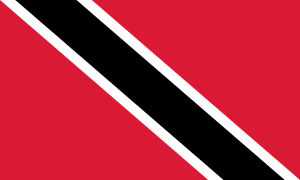A. N. R. Robinson
| His Excellency Arthur Napoleon Raymond Robinson SC OCC TC | |
|---|---|
 A. N. R. Robinson with Sampson Nanton (r.) | |
| 3rd President of Trinidad and Tobago | |
|
In office 19 March 1997 – 17 March 2003 | |
| Prime Minister |
Basdeo Panday Patrick Manning |
| Preceded by | Noor Hassanali |
| Succeeded by | George Maxwell Richards |
| 3rd Prime Minister of Trinidad and Tobago | |
|
In office 18 December 1986 – 17 December 1991 | |
| President |
Ellis Clarke Noor Hassanali |
| Preceded by | George Chambers |
| Succeeded by | Patrick Manning |
| Personal details | |
| Born |
16 December 1926 Calder Hall, Tobago, Trinidad and Tobago[1] |
| Died |
9 April 2014 (aged 87) Port of Spain, Trinidad and Tobago |
| Nationality | Trinidadian and Tobagonian |
| Political party |
People's National Movement Democratic Action Congress National Alliance for Reconstruction |
| Spouse(s) | Patricia Robinson |
| Alma mater |
University of London Oxford University |
| Religion | Methodist |
Arthur Napoleon Raymond Robinson SC, OCC, TC (16 December 1926 – 9 April 2014; known as A. N. R. or "Ray" Robinson) was the third President of Trinidad and Tobago, serving from 19 March 1997 to 17 March 2003. He was also Trinidad and Tobago's third Prime Minister, serving in that capacity from 18 December 1986 to 17 December 1991. He is internationally recognized for his proposal that eventually led to the founding of the International Criminal Court.
Robinson was the first active politician to be elected to the Presidency, and was the first presidential candidate who was not elected unopposed (the Opposition People's National Movement (PNM) nominated Justice Anthony Lucky as its candidate for President). President Robinson sparked controversy in his term in office when he refused to appoint certain Senators recommended by Prime Minister Basdeo Panday following the elections in 2000 and in 2001 when he appointed the Leader of the Opposition Patrick Manning to the position of Prime Minister after a tied election.
Early life
Robinson was born in Tobago in 1926 to James[2] and Isabella Robinson.[3] He was educated at Castara Methodist School (where his father served as head master) and Bishop's High School where he obtained a Higher School Certificate with distinction in Latin and competed for an Island Scholarship. He obtained a Bachelor of Laws degree from London University as an external student. In 1951 he left for the United Kingdom[2] where he was called to the bar at Inner Temple and obtained a degree in philosophy, politics and economics from St. John's College, Oxford.[4] Robinson returned to Trinidad and Tobago where he practised as a Barrister-at-Law.[2]
Robinson married Patricia Rawlins and had two children, David and Ann-Margaret.[2]
Political life
Robinson was a founding member of the People's National Movement and served in the parliament of the West Indies Federation between 1958 and 1960.[4] In 1961 he was elected to the Parliament of Trinidad and Tobago where he served as member of parliament for Tobago. He was the country's first Minister of Finance (from 1961 to 1967).[2] Following the Black Power Revolution in 1970, Robinson resigned from the PNM and formed the Action Committee of Dedicated Citizens (ACDC) which joined forced with the Democratic Labour Party to contest the 1971 General Elections; Robinson and the DLP ended up boycotting the elections in protest over the use of voting machines.[5]
After the 1971 election, the ACDC became the Democratic Action Congress which won both Tobago seats in the 1976 General Elections. As leader as the DAC, Robinson worked for internal self-government for Tobago, culminating in the passage of the Tobago House of Assembly Act in 1980. Robinson resigned from Parliament to contest the Tobago House of Assembly elections, and became the Chairman of the Assembly following victory by the DLP.[5] He had also proposed the idea of the International Court.
In 1981 Robinson allied with the United Labour Front (ULF), under the leadership of Basdeo Panday, and the Tapia House Movement, under the leadership of Lloyd Best, to form the National Alliance for Reconstruction. It entered into an alliance with the Organisation for National Reconstruction, under the leadership of Karl Hudson-Phillips, to successfully fight the Trinidad and Tobago local elections, 1983. Building on this victory the four parties combined to form the National Alliance for Reconstruction (NAR).[6]
ANR Robinson went on to become Prime Minister through the National Alliance For Reconstruction. However, shortly after assuming the Prime Ministership, he developed the traits of being a complete dictator and wanted power at all costs. He dismissed Mr. Basdeo Panday, Mr. John Humphrey, and Mr Kelvin Ramnath from Cabinet. However, Robinson lost the 1991 elections due to his greed and lust for high public office. He rejoined the UNC Administration as a coalition member representating the NAR. However, once again, Robinson proved to be a difficult person to work with, but Mr Panday offered to nominate him to become the next Head of State, i.e. the President of the Republic of Trinidad and Tobago.
ANR Robionson turned out to be someone who brought the Office of the President in disrepute, and continually opposed Mr Panday and obstructed his policies.
Jamaat al Muslimeen coup attempt
During the 1990 coup d'état attempt by the Jamaat al Muslimeen, Robinson and much of his cabinet were held hostage for six days by gunmen under the leadership of Yasin Abu Bakr. When instructed to order the army to stop firing on the Red House, where they were held hostage, Robinson instead instructed them to "attack with full force," an action which led to him getting beaten by his captors. He was also shot in his leg.[7]
Illness and death
Robinson suffered from a number of ailments including a stroke and prostate complications and was hospitalised at the St Clair Medical Hospital after he complained of feeling unwell.[8] Following an illness of several months, he died at St Clair Medical Centre at about 6:00 am on 9 April 2014. The death was confirmed by National Security Minister Gary Griffith, who added that a state funeral was being planned.[6] In reaction, Prime Minister Kamla Persad-Bissessar said that he was "one of our nation's outstanding sons...but the legacy he leaves behind shall surely live on to inspire today's and tomorrow's generations."
Honours
In May 2011 for his great service to this country, the airport in Tobago was renamed the A.N.R. Robinson International Airport, replacing the name "Crown Point International Airport".[9][10]
In November 2011, A. N. R. Robinson was the recipient of Tobago's highest award, the Tobago Medal of Honour.[11][12]
During the investiture of President Thomas Boni Yayi of Benin as a titled Yoruba chieftain on 20 December 2008, the reigning Ooni of Ile-Ife, Nigeria, Olubuse II, referred to President Robinson and his wife as previous recipients of the same royal honour.[13]
References
- ↑ Bui, Hoai-Tran (2014-04-10). "Arthur N.R. Robinson, former prime minister of Trinidad and Tobago, dies at 87". Washington Post. Retrieved 15 April 2014.
- 1 2 3 4 5 "Trinidad and Tobago Parliament".
- ↑ Ira Mathur (20 March 1997). "Memories of Mother Robinson". Iramathur.org. Retrieved 10 April 2014.
- 1 2 "Arthur Napoleon Raymond Robinson". Biographies. Nalis: Trinidad and Tobago National Library and Information System Authority. Retrieved 10 April 2014.
- 1 2 Premdas, Ralph (2000). "Self-Determination and Decentralisation in the Caribbean: Tobago and Nevis". University of the West Indies. Retrieved 10 April 2014.
- 1 2 "Robinson has died". Trinidad Express Newspaper.
- ↑ Taitt, Ria (25 January 2011). "Robbie: I was shot and beaten; Former PM describes hostage ordeal". Trinidadexpress.com. Retrieved 10 April 2014.
- ↑ "Robinson has died". Trinidad Express. 9 April 2014. Retrieved 9 April 2014.
- ↑ "TAU praises ANR Robinson Airport honour". Thetobagonews.com. 12 May 2011. Retrieved 10 April 2014.
- ↑ "The airport has been officially renamed to A.N.R. Robinson International Airport". Tobagoairport.com. 19 May 2011. Retrieved 10 April 2014.
- ↑ "ANR Robinson receives Tobago's highest award". Thetobagonews.com. 1 December 2011. Retrieved 10 April 2014.
- ↑ Parasram, Jai (30 November 2011). "Tobago honours Robinson with island's highest award". Jyoticommunication.blogspot.co.uk. Retrieved 10 April 2014.
- ↑ "His Imperial Majesty, Alayeluwa Oba Okunade Sijuwade, Olubuse ll- The Ooni of Ife". Theooni.org. 20 December 2008. Archived from the original on 3 March 2013. Retrieved 10 April 2014.
External links
| Political offices | ||
|---|---|---|
| Preceded by Noor Hassanali |
President of Trinidad and Tobago 1997–2003 |
Succeeded by George Maxwell Richards |
| Preceded by George Chambers |
Prime Minister of Trinidad and Tobago 1986–1991 |
Succeeded by Patrick Manning |

